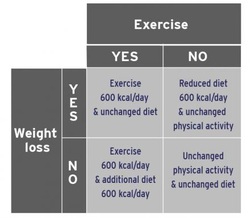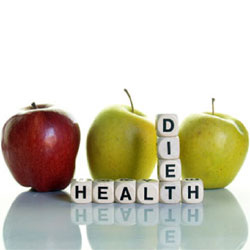Diet & Exercise
Diet: Healthy eating is not about strict dietary limitations, staying unrealistically thin, or depriving yourself of the foods you love. Rather, it’s about feeling great, having more energy, and stabilizing your mood. If you feel overwhelmed by all the conflicting nutrition and diet advice out there, you’re not alone. It seems that for every expert who tells you a certain food is good for you, you’ll find another saying exactly the opposite. But by using these simple tips, you can cut through the confusion and learn how to create a tasty, varied, and healthy diet.
Please visit this page to read more about this very important topic
http://www.helpguide.org/life/healthy_eating_diet.htm
Please visit this page to read more about this very important topic
http://www.helpguide.org/life/healthy_eating_diet.htm

By: Thomas Hoffmann
Here’s some good news for students living on spaghetti and meat sauce and bad canteen food, and for fathers who struggle to find the energy to cook up a proper meal for the family.
If you exercise every day and get your heart rate up just a few times a week, giving it a bit extra when you run, bike or swim, your body will get healthier than if you change your diet in the hope that you’ll lose weight.
If you can’t improve your diet, just exerciseThis is the simple message from a team of Danish researchers who have made the first thoroughly controlled study of how diet and exercise affects overweight men aged between 20 and 40.
“You should of course eat as healthily as possible, but if you have a lifestyle where it’s hard to find the energy to change your diet, you should know that it’s much healthier to spend your energy on physical activity rather than eating differently for the sake of losing weight,” says Pernille Nordby, who has conducted the study as a PhD student at the Department of Biomedical Sciences at the University of Copenhagen.
Exercise affects intestinal hormone:
Facts:
You can safely start exercising on your own with intervals of high intensity which leaves you out of breath.
Three tips from the researcher:
Feel free to take two days in a row with low-intensity workouts. This leaves room for two days of recovery to prepare your muscles for the following days. Eat a proper meal straight after your workout and keep an eye on your fluid balance. This speeds up recovery. Get a good night’s sleep, which is also good for recovery. When the researcher dug deeper into the literature for an explanation of why exercise makes us feel full, she came across a Danish study from 2010, which showed that exercise affects an intestinal hormone called GLP-1, which has attracted the attention of obesity researchers. GLP-1 regulates our appetite, and our bodies secrete more during exercise. ”This may contribute to a picture of how the body up-regulates hormones, enzymes or transmitter substances, making it easier to regulate the appetite and get a feeling of fullness when you’re physically active,” she explains.
“But we still don’t have a clear explanation because the body initiates a whole range of different processes when we move.” Perhaps our diet means less than we think? Nordby also draws a parallel to another Danish study, which was recently published on Science Nordic. Here, researchers had difficulty finding any clear correlation between our diet and our health. The conclusion was that it seems almost irrelevant to the individual’s health whether he or she eats a regular Danish diet or a new Nordic diet with less meat and fat and more vegetables. “Perhaps this study, together with ours, shows that the body is designed to make optimal use of nutrients, regardless of which diet it’s on. And maybe it also shows that our health depends, more than anything else, on how active or inactive we are? “I’m not saying that you shouldn’t make changes to your diet if you eat unhealthy food, but conversely, it is perhaps easier to motivate yourself to engage in a bit of physical activity than it is to change your entire diet.”
http://sciencenordic.com/exercise-better-health-dietary-changes
Here’s some good news for students living on spaghetti and meat sauce and bad canteen food, and for fathers who struggle to find the energy to cook up a proper meal for the family.
If you exercise every day and get your heart rate up just a few times a week, giving it a bit extra when you run, bike or swim, your body will get healthier than if you change your diet in the hope that you’ll lose weight.
If you can’t improve your diet, just exerciseThis is the simple message from a team of Danish researchers who have made the first thoroughly controlled study of how diet and exercise affects overweight men aged between 20 and 40.
“You should of course eat as healthily as possible, but if you have a lifestyle where it’s hard to find the energy to change your diet, you should know that it’s much healthier to spend your energy on physical activity rather than eating differently for the sake of losing weight,” says Pernille Nordby, who has conducted the study as a PhD student at the Department of Biomedical Sciences at the University of Copenhagen.
Exercise affects intestinal hormone:
Facts:
You can safely start exercising on your own with intervals of high intensity which leaves you out of breath.
Three tips from the researcher:
Feel free to take two days in a row with low-intensity workouts. This leaves room for two days of recovery to prepare your muscles for the following days. Eat a proper meal straight after your workout and keep an eye on your fluid balance. This speeds up recovery. Get a good night’s sleep, which is also good for recovery. When the researcher dug deeper into the literature for an explanation of why exercise makes us feel full, she came across a Danish study from 2010, which showed that exercise affects an intestinal hormone called GLP-1, which has attracted the attention of obesity researchers. GLP-1 regulates our appetite, and our bodies secrete more during exercise. ”This may contribute to a picture of how the body up-regulates hormones, enzymes or transmitter substances, making it easier to regulate the appetite and get a feeling of fullness when you’re physically active,” she explains.
“But we still don’t have a clear explanation because the body initiates a whole range of different processes when we move.” Perhaps our diet means less than we think? Nordby also draws a parallel to another Danish study, which was recently published on Science Nordic. Here, researchers had difficulty finding any clear correlation between our diet and our health. The conclusion was that it seems almost irrelevant to the individual’s health whether he or she eats a regular Danish diet or a new Nordic diet with less meat and fat and more vegetables. “Perhaps this study, together with ours, shows that the body is designed to make optimal use of nutrients, regardless of which diet it’s on. And maybe it also shows that our health depends, more than anything else, on how active or inactive we are? “I’m not saying that you shouldn’t make changes to your diet if you eat unhealthy food, but conversely, it is perhaps easier to motivate yourself to engage in a bit of physical activity than it is to change your entire diet.”
http://sciencenordic.com/exercise-better-health-dietary-changes

